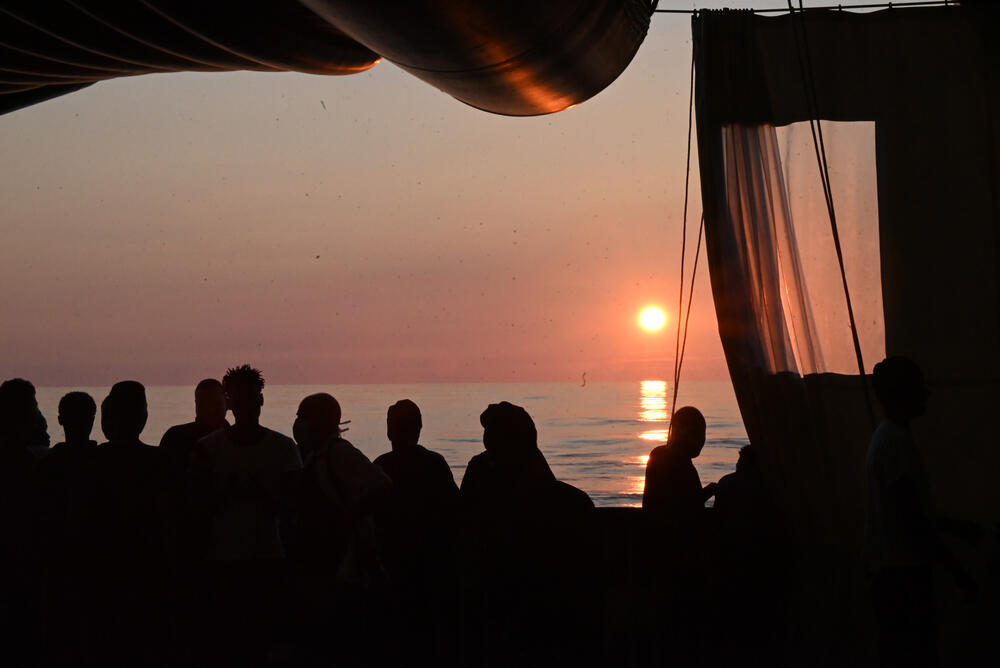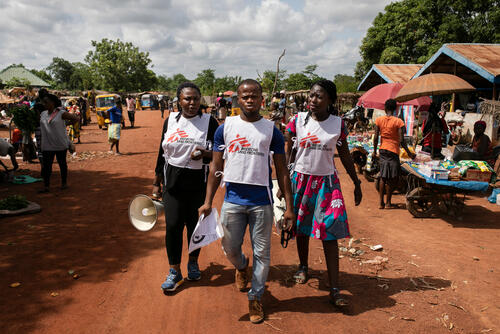Italy: MSF provides support for survivors of deadly shipwreck
A team from Médecins Sans Frontières / Doctors Without Borders (MSF) is providing mental health care to the survivors of a shipwreck off the coast of Italy that killed at least 62 people, including 12 children.
The wreck happened on 26 February near Steccato di Cutro in the south of the country.
About 180 people, mostly from Afghanistan, Iran and Pakistan, were travelling on a wooden fishing boat that had left Turkey (Türkiye) four to five days earlier.
According to reports, the entire group fell into the water about 150 metres from the shore, most likely after the wooden boat hit rocks in bad weather. The body of one person was found tens of kilometres away, due to strong currents.
At least 20 survivors, including one person in need of intensive care, were treated at a local public hospital. There are now about 60 survivors, the majority of them Afghans, in the asylum seeker reception centre in Crotone.
Traumatised people
"[The survivors] are heavily traumatised. Everyone has lost someone,” says Mara Eliana Tunno, an MSF psychologist.
“There is a 16-year-old boy from Afghanistan who lost his sister. He didn't have the courage to tell his parents. They had run away [to help her]. As a woman, her brother told us, she thought she no longer had a future in her country”.
“This tragic shipwreck is a painful reminder that restrictive migration policies will not stop desperate people from fleeing"
MSF teams have provided psychological support to around 60 people and will continue to assist in the coming days, in agreement with the Italian authorities.
Among the accounts from survivors heard by our teams, there are minors who have lost their parents and family members:
A 12-year-old boy lost his entire family, while a 17-year-old who was hospitalised lost his parents. There is another boy who spoke of losing his six-year-old brother to hypothermia four hours after the shipwreck.
Dangerous policies
While most deaths at sea still occur along the central Mediterranean route between Libya and Italy – where MSF operates the search and rescue vessel Geo Barents – in recent months our teams have observed an increase in the number of people making the dangerous crossing from Türkiye to southern Italy.
On 23 February, the Geo Barents was unfairly detained and fined by the Italian government. Even though this measure directly targets MSF, the real price will be paid by those fleeing across the central Mediterranean who will be left without assistance.
“This tragic shipwreck is a painful reminder that restrictive migration policies will not stop desperate people from fleeing,” says Sergio Di Dato, MSF project leader.
“People will continue to risk their lives as they often have no other option.
“The Italian and EU governments must stop criminalising migration and humanitarian assistance. They must instead focus on providing adequate safe and legal channels to migrate and improved mechanisms to assist and protect people on the move.”
In 2022, MSF teams in Italy launched a project near Crotone to provide medical and psychological support at disembarkation points, with a focus on identifying people with medical needs who can be guaranteed continuity of care.
MSF has been active and engaged in search and rescue activities since 2015, working on eight different search and rescue vessels (alone or in partnership with other NGOs) and rescuing more than 85,000 people.
Since launching search and rescue operations on board the Geo Barents in May 2021, MSF has rescued 6,194 people (including 3,742 in 2022), recovered the bodies of 11 people who died at sea and assisted in the delivery of a baby on board.
UK Government support
The UK Government has been a key supporter of these punitive EU migration approaches, both in the Mediterranean and on land borders.
It has previously provided funding and training to the Libyan Coastguard and detention system, which have been implicated in dangerous, illegal pushbacks and other forms of mistreatment of people seeking safety.
Support has also been extended to border management authorities in Greece, where several reports have documented increased use of pushbacks and where our teams treat those impacted by these restrictive policies in Lesbos and Samos.
It has been clear for too long that a punitive, ‘deterrent’ approach – which the UK has also sought to replicate on its own borders – only pushes people into still more dangerous journeys, with devastating effects.
It is crucial that ministers think again and change their approach, focusing instead on safe routes which are the only effective way to help prevent these tragedies.
MSF and search and rescue
Every year, thousands of people fleeing violence, insecurity, and persecution attempt to cross the Mediterranean Sea. They make this treacherous journey via North Africa and Turkey, in search of relative safety in Europe.
And, every year, countless lives are lost at sea, while people face unimaginable cruelty on their way through transit countries such as Libya.
Between 2014 and 2021, at least 24,400 people have drowned or gone missing while attempting to cross the Central Mediterranean. In 2017, a study found it to be the world's deadliest border.

